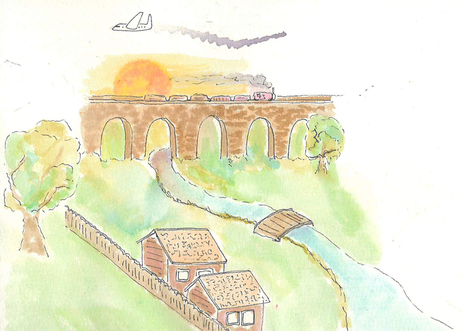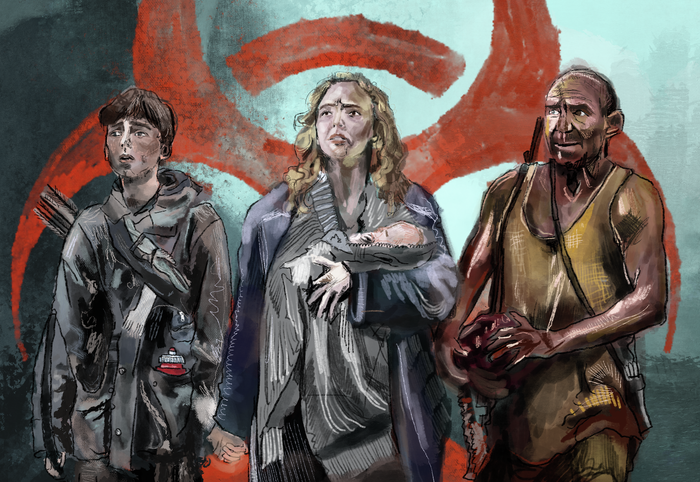Life is a highway? Three films about the transformative properties of an open road
Ruby Randall embraces the transience of the summer with these travelling recommendations

In 2003, my dad was not only at the point in life when a person seriously considers buying and living in a nuclear bunker, but almost losing all his remaining marbles in the depths of a secluded Russian forest. He was travelling from Cotgrave around Europe and Northern Africa with the aim of reaching Cape Town on a homemade motorbike. From the stories I’ve been told, he found himself at different points in this journey; a witness in a murder investigation, getting caught in a sandstorm, being given surreptitious fish from a German biker, and almost falling off a mountain top with his bike in tandem. What his trip, and the following three films have suggested to me is that when taken out of the systems of everyday life, and indeed the industry of tourism and resort travel, people can be given the space and time to experience themselves and their companions beyond a prescribed routine of living.
“By harnessing the momentum of a downward spiral rather than pushing against it, the Hoovers go beyond winning or losing and start living”
Little Miss Sunshine (2006)
It’s safe to say that, if nothing else, Little Miss Sunshine is a film about losing. In a bright yellow VW camper, we tag along with Olive Hoover as she drags her family across America to compete in the national ‘Little Miss Sunshine’ beauty pageant. Primarily against their will, her brother Dwayne (under a vow of silence and determined to join the Air Force), Grandpa Edwin (kicked out of his care home for drug use and foul behaviour), and Uncle Frank (in his sister’s care due to a suicide attempt following a romantic betrayal and being deposed as America’s #1 Proust scholar) are crammed into the rattletrap bus with Olive and her parents. This film is much more about the journey than the destination: we’re shown a select few of the states’ worst motel parking lots and petrol stations, but everything that matters in the film really occurs on the road. By the time the camper actually reaches the competition, every passenger minus the youngest family member has become disillusioned with their various systems of reaching success; Richard, Olive’s father and a motivational speaker loses his book deal on how to ‘win’ at life, the family experiences a personal loss, and the film’s outlook begins to look a lot like something Dwayne’s Nietzsche mural would devise. However, by the closing credits, the system for success is itself nullified. By harnessing the momentum of a downward spiral rather than pushing against it, the Hoovers go beyond winning or losing and start living. Possibly this is something only a trip gone very very wrong can teach.
“The encounters along the journey mould their holiday into a far more transformative experience”
The Motorcycle Diaries (2004)
Based on Ernesto or ‘Che’ Guevara’s memoirs of the same name, Walter Salles’ film effectively starts with a medical student’s last hurrah before completing his degree, and ends with Che’s friend and travel companion (Alberto Granado)’s recollections of Guevara’s life and assassination as Marxist revolutionary and counter-cultural icon. Alberto and Ernesto leave their homes in Argentina to embark on a cross-continent trip across South America on a Norton 500 motorbike ironically christened ‘La Poderosa’ or ‘The Mighty One’ which splutters to an oily end only a few days into the trip, having been held together by elastic bands and scraps of string. Though their initial goals are simply to make a bit of money, treat some lepers and bed some women, Che discovers the reality of the people they meet and stay with along the journey. The deep veins of inequality running through the societies (ancient as Inca structures, and new as temporary leper colonies) the pair encounter mould their holiday into a far more transformative experience, and Che’s birthday toast by the film’s end anticipates a political voice bursting through its snapshot of his early life.
To Wong Foo, Thanks for Everything! Julie Newmar (1995)
If I had a nickel for every movie about drag queens on a road trip exploring their sense of individuality and inspiring communities around them, I’d only have two nickels, but it’s weird that it happened twice. Like its slightly more psychologically complex sister, The Adventures of Priscilla, Queen of the Desert (1994), To Wong Foo is about three drag queens travelling for a show who don’t follow a smooth path from point A to B. Unlike The Adventures of Priscilla, however, almost the entirety of To Wong Foo takes place off-route in Snydersville – a small town the trio (Vida, Noxeema, and Chi-Chi) find themselves in after their rented Cadillac breaks down. Like the diverted paths of The Motorcycle Diaries and Little Miss Sunshine, Snydersville is significantly changed by the glamour girls’ presences as they empower its women and generally spread kindness and vitality in what is a pretty simple heartwarming comedy plot line.
 News / Judge Business School advisor resigns over Epstein and Andrew links18 February 2026
News / Judge Business School advisor resigns over Epstein and Andrew links18 February 2026 News / Gov grants £36m to Cambridge supercomputer17 February 2026
News / Gov grants £36m to Cambridge supercomputer17 February 2026 News / Hundreds of Cambridge academics demand vote on fate of vet course20 February 2026
News / Hundreds of Cambridge academics demand vote on fate of vet course20 February 2026 News / CUCA members attend Reform rally in London20 February 2026
News / CUCA members attend Reform rally in London20 February 2026 News / Union speakers condemn ‘hateful’ Katie Hopkins speech14 February 2026
News / Union speakers condemn ‘hateful’ Katie Hopkins speech14 February 2026










